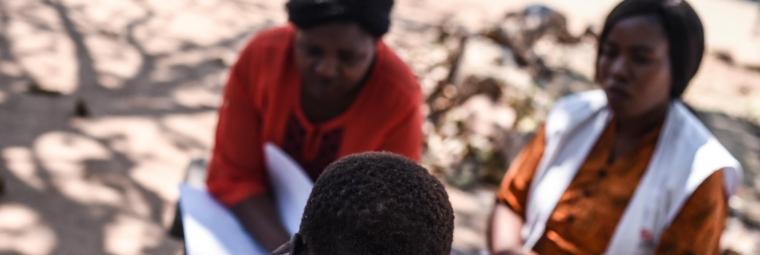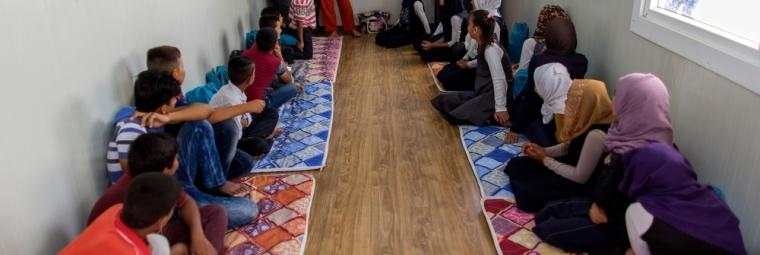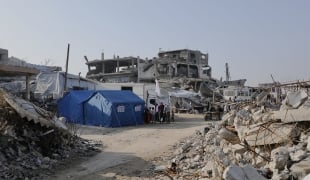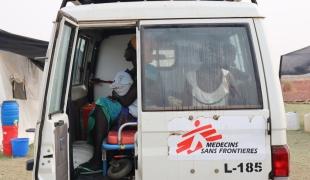Psychologists: doctors without borders just like the rest

Both in Kenya and elsewhere, it is becoming more and more common for psychologists to go and support doctors without borders. World Mental Health Day is the perfect opportunity to focus in on this.
Now aged 24, Siyad Abdi Ar was 16 when he was abused by armed men in Somalia. He has never recovered from it. His mother was forced restrain him to make sure that he didn’t wander away in the Dadaab refugee camps in Kenya, where they fled in 2010.
Almost half a million people piled into Dadaab after fleeing the violence and drought in Somalia. The majority of refugees arrived traumatised. Médecins Sans Frontières has been running a hospital and several health posts in Dagahaley, one of the Dadaab camps, since 2009. One of the types of care provided there is mental health counselling. In Kenya, as in other countries where MSF has a presence, psychologists are now an integral part of the medical organisation’s teams.
“In Dadaab, and in Africa in general, psychological distress does not manifest itself in the same way as in wealthier countries. People complain about physical pain. During our sessions with them, we try to help them to understand that these pains are linked to their emotional condition,” explains psychiatrist Pablo Melgar Gomez, with MSF in Dadaab between 2009 and 2010, and now working with Palestinian refugees in Lebanon.
Several sessions is often enough to overcome the trauma. In Dadaab, there was no way of supporting the most serious cases, such as Siyad Abdi Ar. People with schizophrenia or bipolar disorders were left to manage on their own. “When I was in Dadaab I saw about ten ill people who had been restrained or locked away by their totally helpless families,” Pablo tells us. “There are no psychiatric facilities that could cure them, but without our intervention, these people would still be in restraints today.”
Dealing with the most urgent cases
According to the World Health Organisation (WHO), there are 450 million people in world who suffer from at least one mental illness. 85% of them live in low- and middle-income countries. Many of these people have no access to treatment. In the event of war or a natural disaster, the rate of people suffering from common mental illnesses such as depression or anxiety can reach 25 to 30%, which is two or even three times above normal.
In extreme situations, everyone experiences heightened feelings of anxiety or sadness: this is a normal reaction to an event which is anything but. But overall, people who are exposed to these situations end up adapting to them, particularly with the help of their loved ones. If this is not the case, psychological or even psychiatric treatment is required.
In emergency situations, MSF psychologists address the most pressing needs. In a refugee camp, or after an earthquake like the one in January 2010 in Haiti, emergency counselling sessions not only tried to help patients overcome their response to the trauma, but also to provide suitable treatment to those suffering from pre-existing and severe mental illnesses.
Psychological suffering can often be difficult to detect. This is because it can often manifest in the form of physical pain. MSF’s task is therefore also to help and train healthcare workers to spot these patients. They are typically people who complain vaguely of pain, or who come back several times for the same reason without anyone being able to make a diagnosis. This is why mental health management needs to be incorporated into the care provided by MSF.
Psychologists everywhere?
Rape victims in the Democratic Republic of the Congo (DRC) or victims of violence are also provided with psychological counselling sessions. Although the presence of psychologists in emergency or conflict situations is accepted as given, they are far from being integrated into other field interventions.
Psychological support can, however, be useful in a number of other contexts. “A depressed mother in a feeding centre will not be able to look after her child properly and get them to gain weight. Likewise, psychological support can help patients suffering from HIV/AIDS or tuberculosis to respond better to treatment,” Pablo says.
In 2011, teams provided almost 170,000 individual psychological consultations and 19,200 group sessions across the countries in which MSF was present.

Learn more about the Psychiatrist job
Discover the job description


